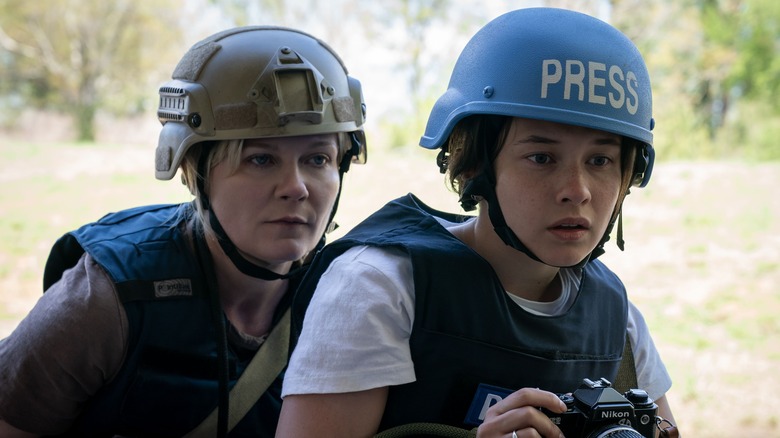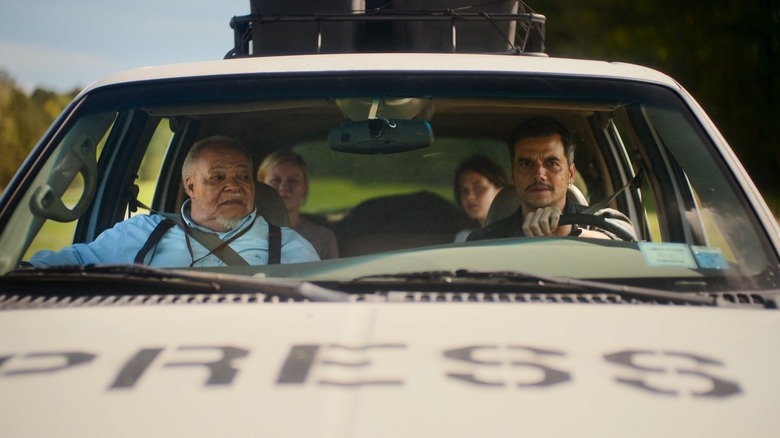Civil War Review: This Is How The World Sees America - And It's Terrifying
- Kirsten Dunst and Cailee Spaeny lead a great cast
- Viscerally powerful filming
- Not as "apolitical" as you've been led to believe
- The worldbuilding makes little sense
- Anyone with sound sensitivities should avoid the IMAX
In Vietnam, "Civil War" is being released under the title "The Fall of an Empire." Both titles say something different about the film: where "Civil War" emphasizes the cautionary themes about brother-against-brother political polarization, "The Fall of an Empire" offers up the spectacle of a global superpower destroyed by itself and facing the violence it has subjected the rest of the world to. The disturbing images captured by the film's photojournalist protagonists evoke real violent images of the kind we saw in the Vietnam War and that we're seeing now out of Gaza.
Watching "Civil War" as an American is undeniably weird. I assume the same can be said for watching "Apocalypse Now" as a Vietnamese, or watching "The Hurt Locker" as an Iraqi, or just generally seeing how American filmmakers depict the politics of other countries. Some of the ways British director Alex Garland handles American politics are inevitably going to feel off, but some of that off-ness is to its advantage: this is science fiction, not a documentary, and it's definitely not the "how to" guide that some feared. Intellectually distinct from our reality but capable of visceral disturbance, the film manages to uncover significant elements of truth despite the worldbuilding not entirely making sense.
How does one stay neutral in a war zone?
What's sure to be the most controversial aspect of "Civil War" is how it refuses to spell out all the details about how and why the war is happening. Some have pegged it as an "apolitical" movie because of this, but that's not an accurate descriptor. There are more than enough context clues to figure out the "why" of the war, and while the "how" sometimes strains believability in the name of avoiding direct partisan parallels (the alliance between California and Texas somehow ends up easier to buy than some of its other big asks), the film's not exactly taking a centrist stance about the political situation depicted either. What it is doing, however, is presenting this political situation from the perspective of journalists who are trying to stay objective for their job.
The main team of journalists we follow from New York to Washington, D.C. consists of two photographers, the veteran Lee (Kirsten Dunst) and newcomer Jessie (Cailee Spaeny of "Priscilla" fame), and two writers, Joel (Wagner Moura) and Sammy (Stephen McKinley Henderson). These people will go through Hell to get the big scoop. Whether or not their reporting makes a difference is up for question, but they all feel someone has to do it — that the third-term President (Nick Offerman) is actively hostile to journalists makes our protagonists' determination to report on the fighting in D.C. and the oncoming end of the war all the more significant.
Dunst and Spaeny are great not only as actors but as photographers themselves — according to a post-screening Q&A, they actually took all the still photos shown in the film! The mentor-student relationship between Lee and Jessie, and the way Jessie steadily must desensitize herself to the horrors surrounding her in order to do what her hero does, is the most compelling character arc in the film, though Joel also undergoes his own subtler reckoning with journalistic ethics as his attempt to score an interview with the President transforms into a different sort of assignment as the war takes its turns.
Hard to watch yet often gripping
"Civil War" spends its first hour as an episodic road trip, with different scenes along the journalists' journey playing as tense and provocative vignettes. One of the most interesting recurring subjects, and the one that feels most accurate to the past eight years in America, is how many people just try to avoid thinking about the war entirely. Both Lee and Jessie come from families who'd rather pretend the conflict didn't exist, and a sequence of an entire town in denial emphasizes what the price of such a mindset entails.
The film is at its absolute best for a solid 10-minute stretch approaching the battle for D.C. Jesse Plemons (Kirsten Dunst's real-life husband) steals the show as a terrifying unnamed soldier without a care for the rules of war, who makes it clear the journalists' safety in his presence depends on "what type of American" they are. The tension here elucidates the nature of the film's politics and explodes into painful carnage — yet this conflict also allows for one of the film's few moments of unqualified heroism, and its mournful aftermath leads into the film's most striking moment of pictorial beauty.
Once the battle for D.C. gets going, "Civil War" enters full-on action bombast, a rare foray into blockbuster-y sensibilities for the arthouse-leaning studio A24. The nature of the battle is hard to discuss without spoilers, but suffice it to say the film maintains its hyper-provocative core and its dedication to the journalists' point of view, even when it feels at risk of being just a few different choices away from turning into a completely different kind of film. I'm not sure what to think about all of it — though I presume that ambivalence is exactly what the film is going for.
One last word of warning: this movie is one of the LOUDEST I've ever seen. The decision to use full rounds for all the gunshots certainly makes it realistic in terms of placing one in the characters' trauma, but with an IMAX sound system, one might question the necessity of having to feel actual physical pain as a viewer as opposed to just empathetic emotional pain necessary for the story. While "Civil War" is worth seeing and thinking about for those who can stomach it, it's likely easier to stomach at a slightly lower decibel level.
"Civil War" opens in theaters April 12.


